- 2025 Year in Review: 80th Anniversary Highlights at Zhejiang University Guanghua Law School2025-12-31
- The Second China–Latin America and Caribbean Region Legal Professionals Exchange Program (Hangzhou Session) was successfully held at Zhejiang University.2025-12-18
- “If the World is a Family” — Student Exchange and Legal Practice Seminar between Newcastle Law School and Guanghua Law School2025-12-08
From January 12th to 18th, 2025, Zhejiang University Guanghua Law School organised a seven-day winter camp academic trip to Korea. A total of 42 students participated in this program, which was led by Associate Professor Ma Guang, Ms. Wang Kaixuan and Ms. Bai Lu. The winter camp aimed to deepen students' understanding of the Korean legal system and culture, while fostering exchanges in legal education and practice between China and Korea.
During the winter camp, the faculty and students visited several prominent institutions,includingKoryo University, Kim & Chang, Sungshin University, Seoul National University, Korea Prosecutor's Office, National Assembly, Korea Grand Court, and Korea Commercial Arbitration Court. These visits offered participants the opportunityto broaden their international legal perspectives and gain a comprehensive understanding of Korea's legal framework, history, and culturethrough direct engagemen and discussions.
Uponarriving at Seoul, the first stop was Gyeongbokgung Palace, a symbol of Korea’s historical and cultural heritage., Thevisit of the iconic landmarkimmersed our group in a deep cultural atmosphereand officially set the stage for the academic exchange. After touring the palace, the group continued journey to Cheong Wa Dae, where they explored the historical and political significance carried by this building. The first day's visit provided students with a preliminary understanding of Korean history, culture and politics, laying a foundation for the academic conmunication that followed.
On the morning of January 13th, the faculty and students visited Koryo University. The lecture, titled "TheInternational Law Regime in Cyberspace"was delivered by Professor Ruhsin Park from the Faculty of Law,Koryo University. Professor Park provided an in-depth analysis of the borderlessness nature of cyberspace and its challenges to international law. He highlighted the significanceof the Tallinn Manual, particularlyin the context of the 2007 Estonian cyberattack and analysed the two major mechanisms of the United Nations for cyberspace governance: theGroup of Governmental Experts (GGE) and theOpen-Ended Members Working Group (OEWG). The lecture was informative and the interactive sessions were very engaging. Everyone gained valuable insights from the experience.
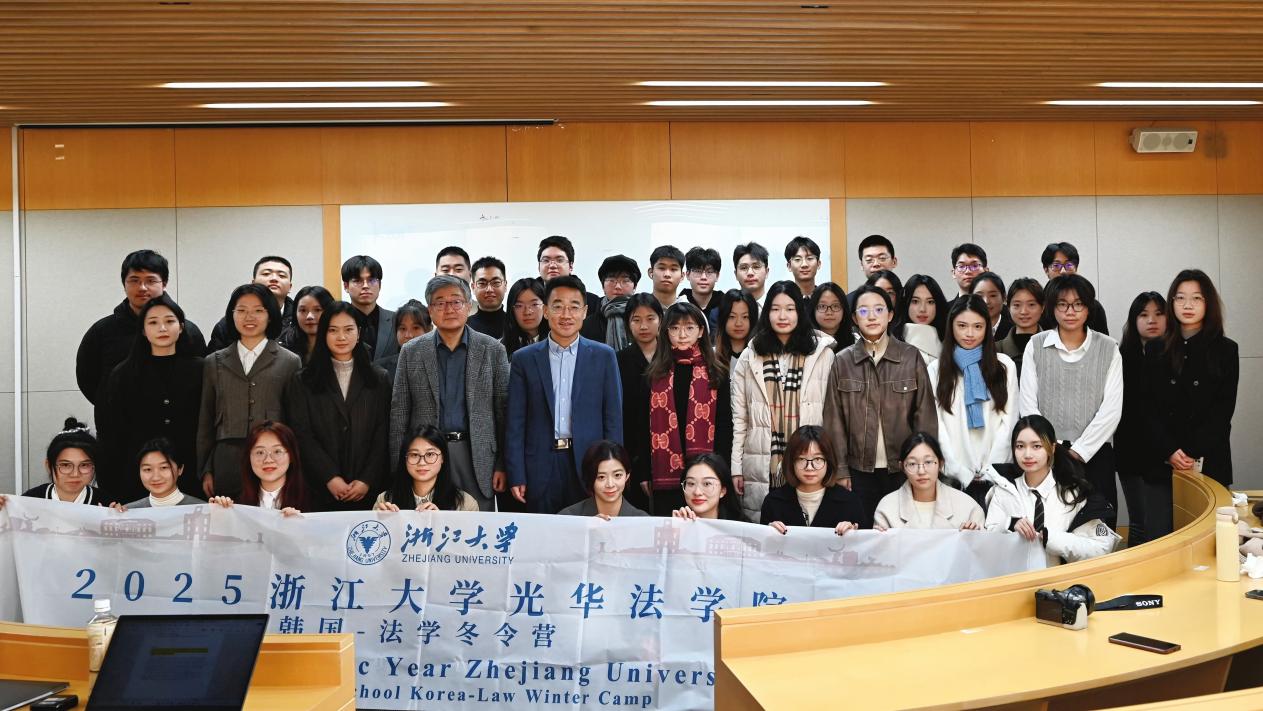
(Group photo with Professor. Ruhsin Park of Koryo University)
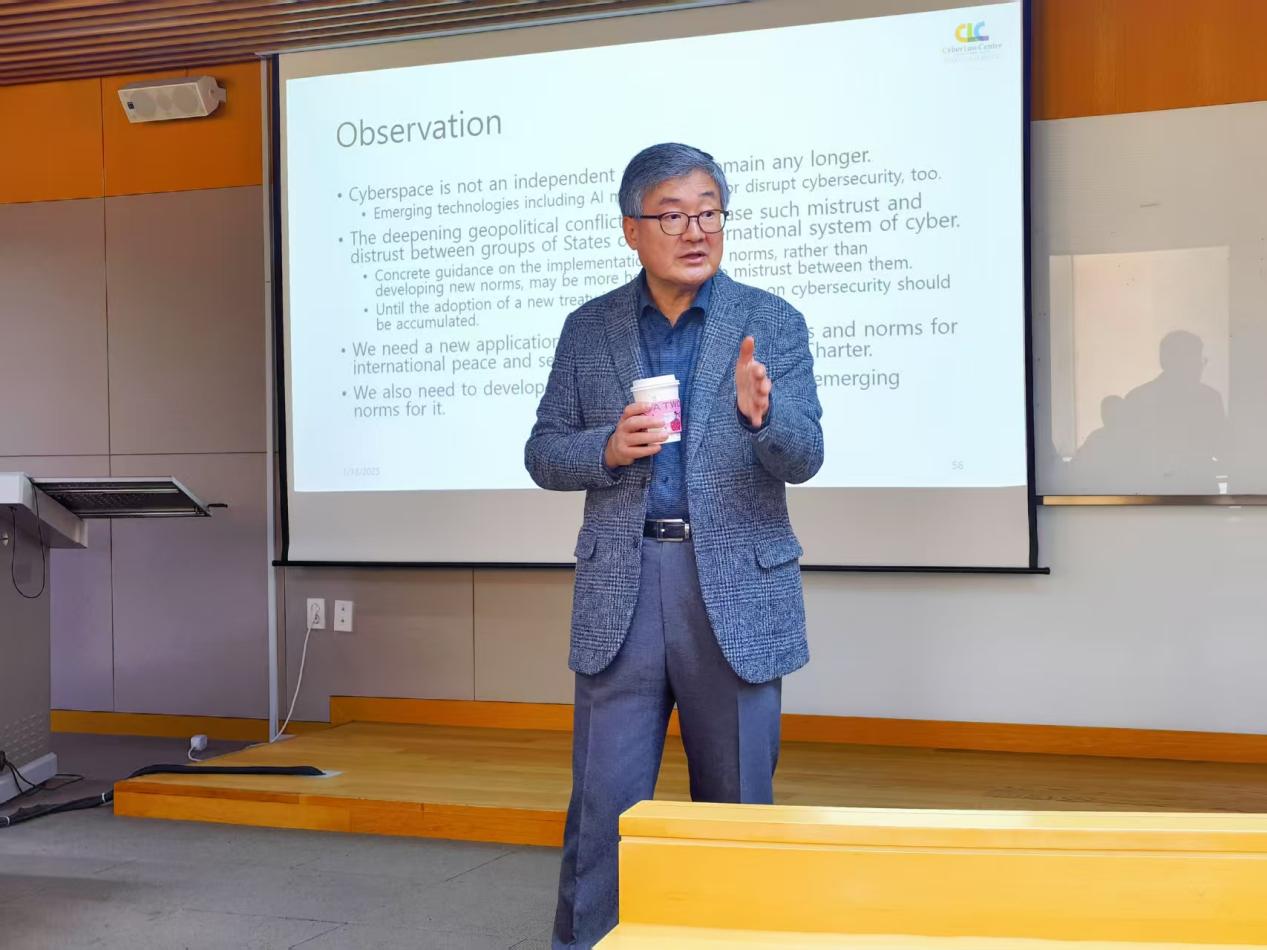
(Professor. Ruhsin Park's lecture)
On the afternoon of January 13th, faculty and students visited Kim & Chang, the largest law firm in Korea. Chun Qing, an international lawyer at Kim & Chang, gave an overview of thefirm's history and its global standing. Leung Kyung-mo, another foreign lawyer at the firm, introduced the significant differences between China and Koreain areas of trial system, penalty system and constitutional court, and analysed the current state of the Korean judiciary and the reformpath with the combination of case studies. The lecture, titled"differences between the Chinese and Korean legal systems" was highly engaging. During the exchange, students asked questions actively, the lawyers responded them patiently and offered valuable career advice. The interactive sessionfostered a relaxed and dynamic atmosphere,and both students and faculty greatly benefited from the discussion.
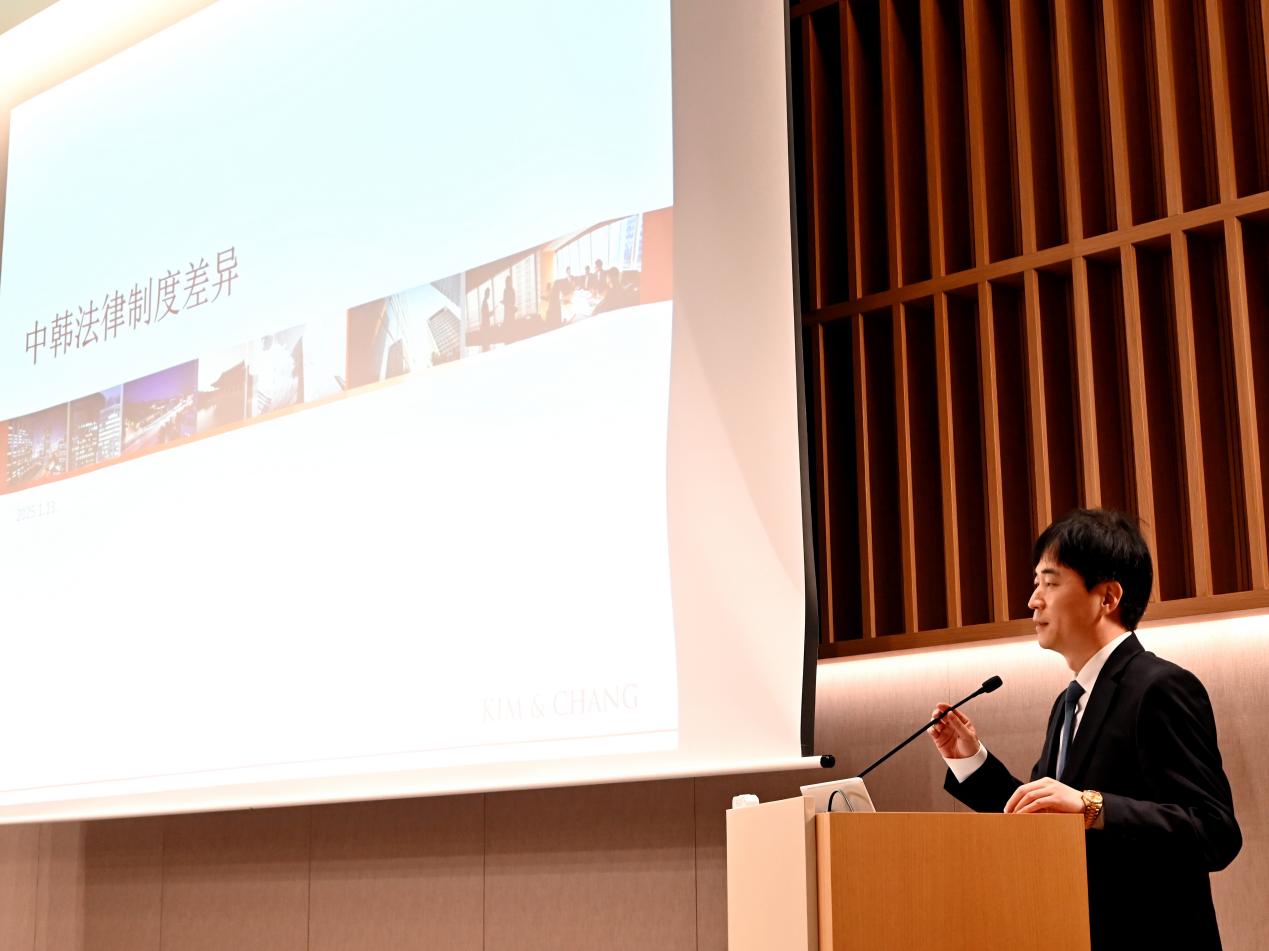
(Kim & Chang in communication)
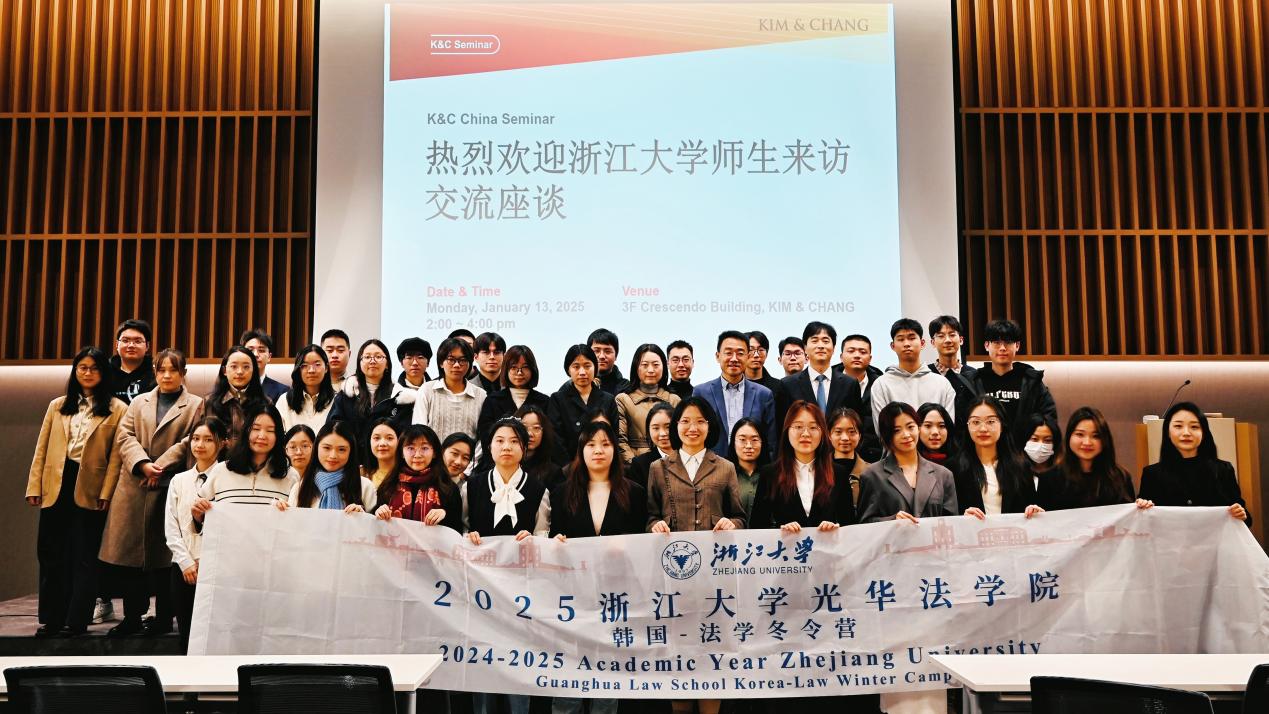
(Group photo with lawyers from Kim & Chang)
On the morning of January 14th, Guanghua Law School of Zhejiang University and School of Law of Sungshin University jointly held the 2nd Sino-Korean Comparative Law Symposium. The symposium was divided into two sessions, focusing on environmental law and digital rule of law, under the theme of "The Latest Changes in the Legal Systems of the Two Countries". The conference was chaired by Professor Kwon Hyun-ho from the School of Law, Sungshin University, with translation provided Associate Professor Ma Guang, Guanghua School of Law, Zhejiang University, and student Jin Xinji. The opening ceremony was addressed by Professor Hwang Tae-hee, Dean of the School of Law,Sungshin University, ProfessorLee Jong-min, Director of the International Cooperation Office of Sungshin University, and Associate Professor Ma Guang of Guanghua Law School, Zhejiang University.
In the first session, Yang Xiao from Zhejiang University analysed the legislative logic and provisions of China's Energy Law in the context of the dual-carbon goal, highlighting its strengths and weaknesses. Li Yoon-kyung from Sungshin University conducted a comparative discussion on the limitations of South Korea's carbon-neutral policy andits potentialimprovement, emphasizing the importance of intergenerational equity and international cooperation. The session was followed by comments from LiXinrui, students of Guanghua Law School of Zhejiang University, and Shin So-min,students of School of Law of Sungshin University
The second sessionbegan withKim May Ting from Sungshin University, who introduced Korea's positive practice in digital sex crime legislation using the case of in-depth forgery of sex crimes as an example. ZhouJia from Guanghua Law School of Zhejiang University then discussed the construction and challenges of China's digital rule of law system, stressing the important role of digital law in safeguarding human rights and achieving justice. Comments were provided byZengDiani from Guanghua Law School of Zhejiang University and Park Zhisu from School of Law of Sungshin University.
The symposium concluded with presentations on conflict resolution mechanisms. ZhangQingyue from Guanghua Law School ofZhejiang University shared the "Fengqiao Experience" a Chinese approach to conflict and dispute resolution, while Professor Kim Se-jun from Sungshin University outlined the Civil Mediation Law of Korea and the multi-dimensional mechanism for resolving conflicts in Korea.
The seminar deepened mutual understanding of both sides on environmental law and digital law, and provided new opportunities for legal research and cooperation between China and Korea.
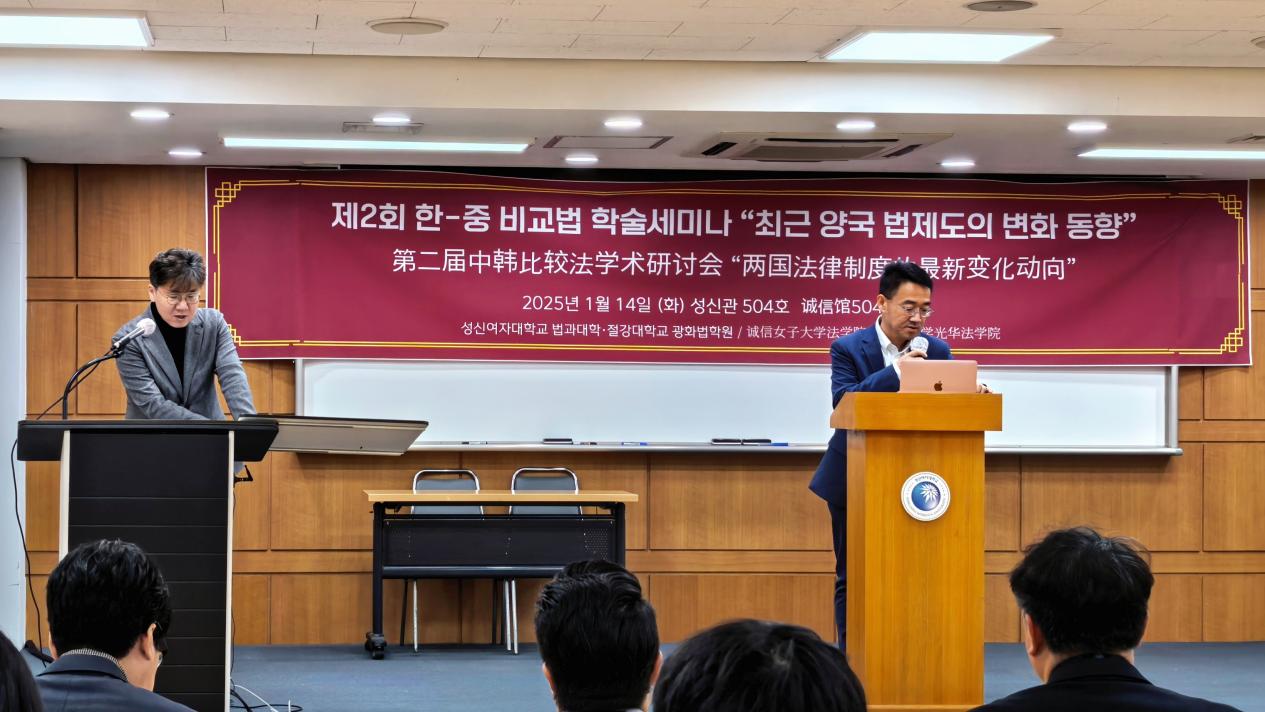
(On an exchange programme with Sungshin University, Korea)

(Group photo with teachers and students of Sungshin University)
On January 15th, faculty and students visited Seoul National University and the Grand Prosecutor's Office to gain a deeper understanding of Korea's legal system. In the morning, Professor Kang Kwang-man of Seoul National University delivered a lecture titled "Outline of the Korean Constitutional Adjudication System." He provided a comprehensive overview of the organizational structure and functions of the Constitutional Tribunal, focusing onthe unique features of the Constitutional Petition Trial. Through case studies, he illustrated how the system operates and its associated controversies, which led a sparking thought-provoking discussion and active participation from the students.
In the afternoon, the group visited the Korea Grand Prosecutor's Office, where Investigator Na-rae Choi presented the historical development and technological advancements of Korea's prosecution system, tracing its evolutionfrom the "Eight Laws" to its currentmodern framework. The students had the opportunity to observe the advanced investigative equipment, to exploredigital forensics centre and to visit prosecutor's office. Students even had a chance to wearprosecutor's uniform for a photo, so as to deeply feel the responsibility and professional allure that comes with the legal profession.
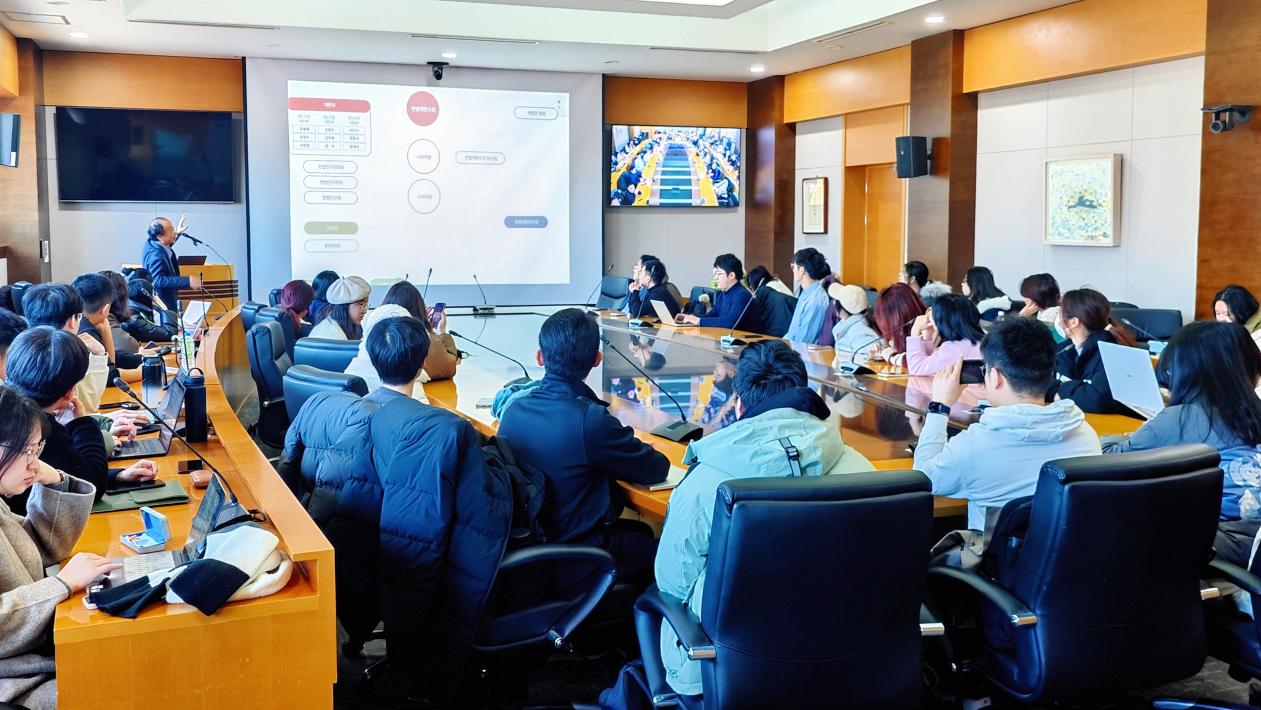
(Professor Jiang Guangwen in lecture)
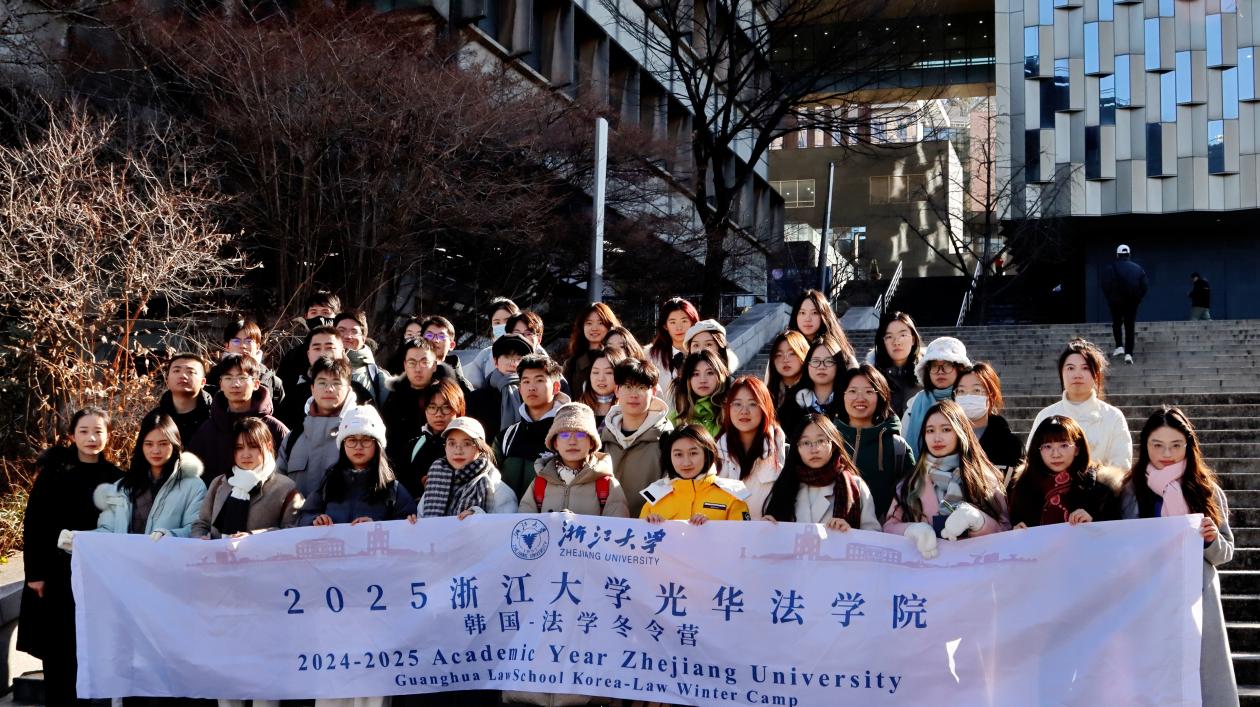
(Group photo at Seoul National University)
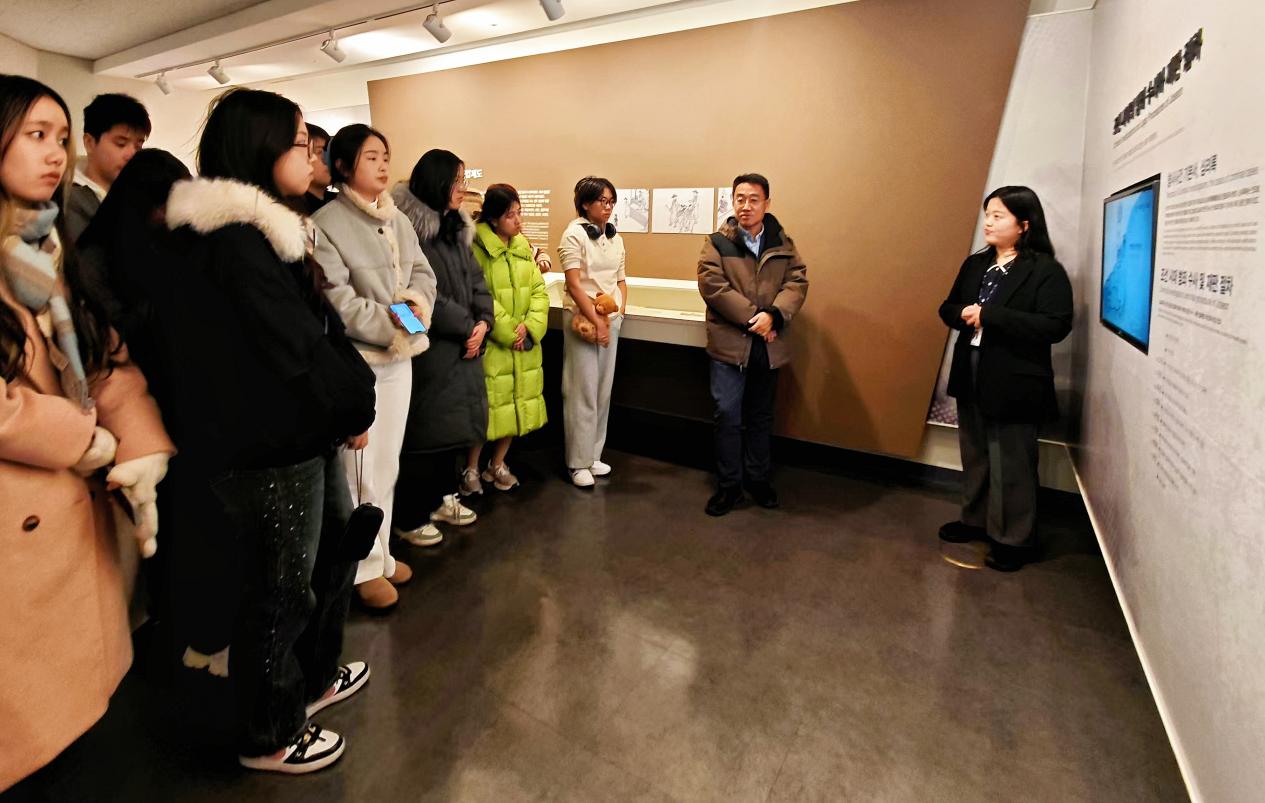
(During an exchange at the Korean Grand Prosecutor's Office)
On January 16th, faculty and students visited the National Assembly of Korea to gain a deeper understanding of the Korean parliamentary system. Under the detailed guidance of Yoo Jae-min, Director of Social Budget Analysis at the Budget Policy Bureau of the National Assembly, the students acquired a thorough understanding of the historical evolution of the Korean parliamentary system, its operation mechanism, and, in particular, the structure of political parties, the legislative process, and the purpose of its checks and balances mechanism. During the interactive session, students actively engaged byasking questions to further deepen their understanding of the parliamentary system. Afterwards, guided by Yoo Jae-min, the group toured the National Assembly meeting room.The layout and furnishings closely reflect its legislative and deliberative functions, fully demonstrating the precision and professionalism of the National Assembly as the centralhub of state power.
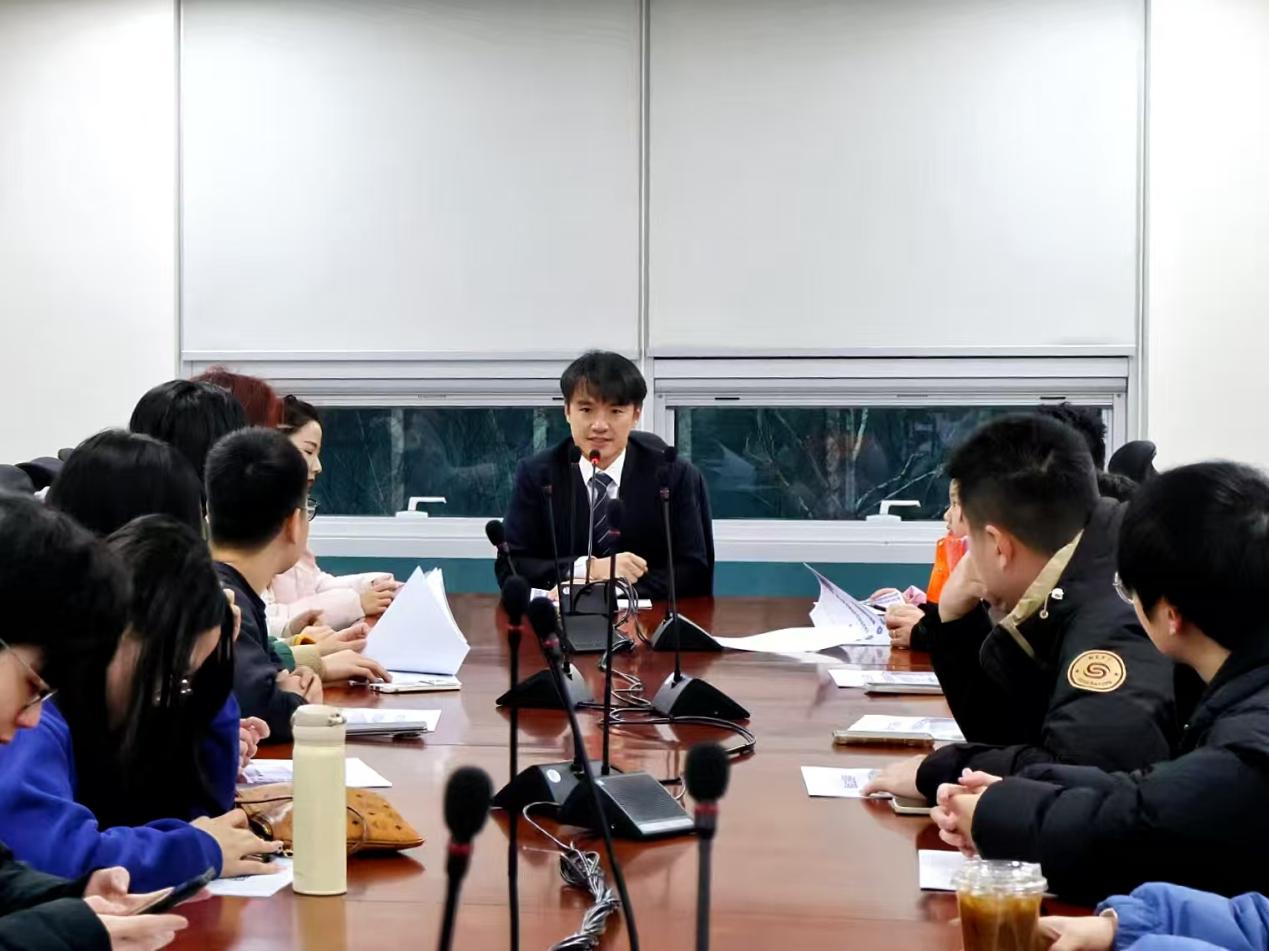
(In communication with Congressional officials)

(Group photo with officials of the National Assembly of Korea)
On January 17th, faculty and students visited the Korean Grand Court and the Korean Commercial Arbitration Institute (KCAI). In the morning, the group toured the Korean Grand Court to learn more about the development and operations of the Korean judicial system. The visit began at the Historical Exhibition Hall, where Kim Eun-sil, the International Review Officer of the Grand Court, introduced the origins and evolution of the Korean judicial system. Afterward, under the guidance of Jeong Cheol, the Court Clerk, the group visited the courtroom, to understand the layout and functions of the courtroom in detail. In addition, the group learned about the historical evolution of the attire worn by Korean judges, offering a glimpse into the culture and traditions of the Korean judiciary. In the afternoon, faculty and students visited the Korean Commercial Arbitration Institute to further their understanding of the commercial arbitration system in Korea and the latest development in the arbitration market. Kim Sae-in, Director of the International Arbitration Centre of the KCAB, shared valuable insights into the current state and trends in thearbitration market, drawing from his extensive practical experience. This one-day visit not only broadened the students' international perspectives, but also laid a solid foundation for their future legal careers.

(Group photo with the International Review Officer of the Korean Grand Court)
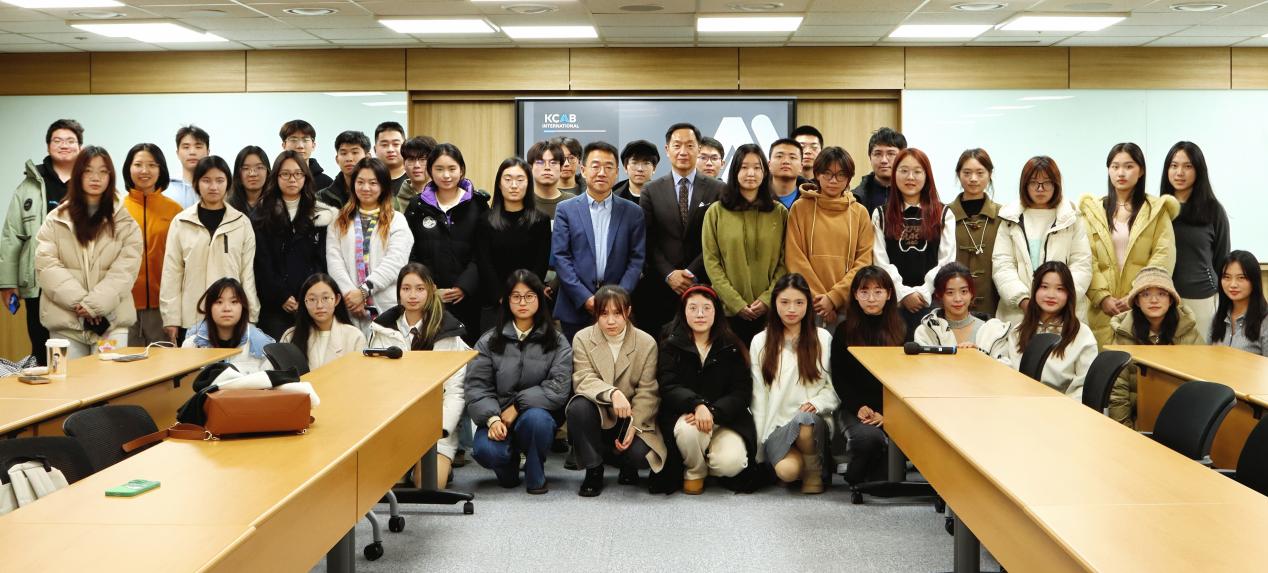
(Group photo with Director Kim Se-in of the Korean Commercial Arbitration Court)
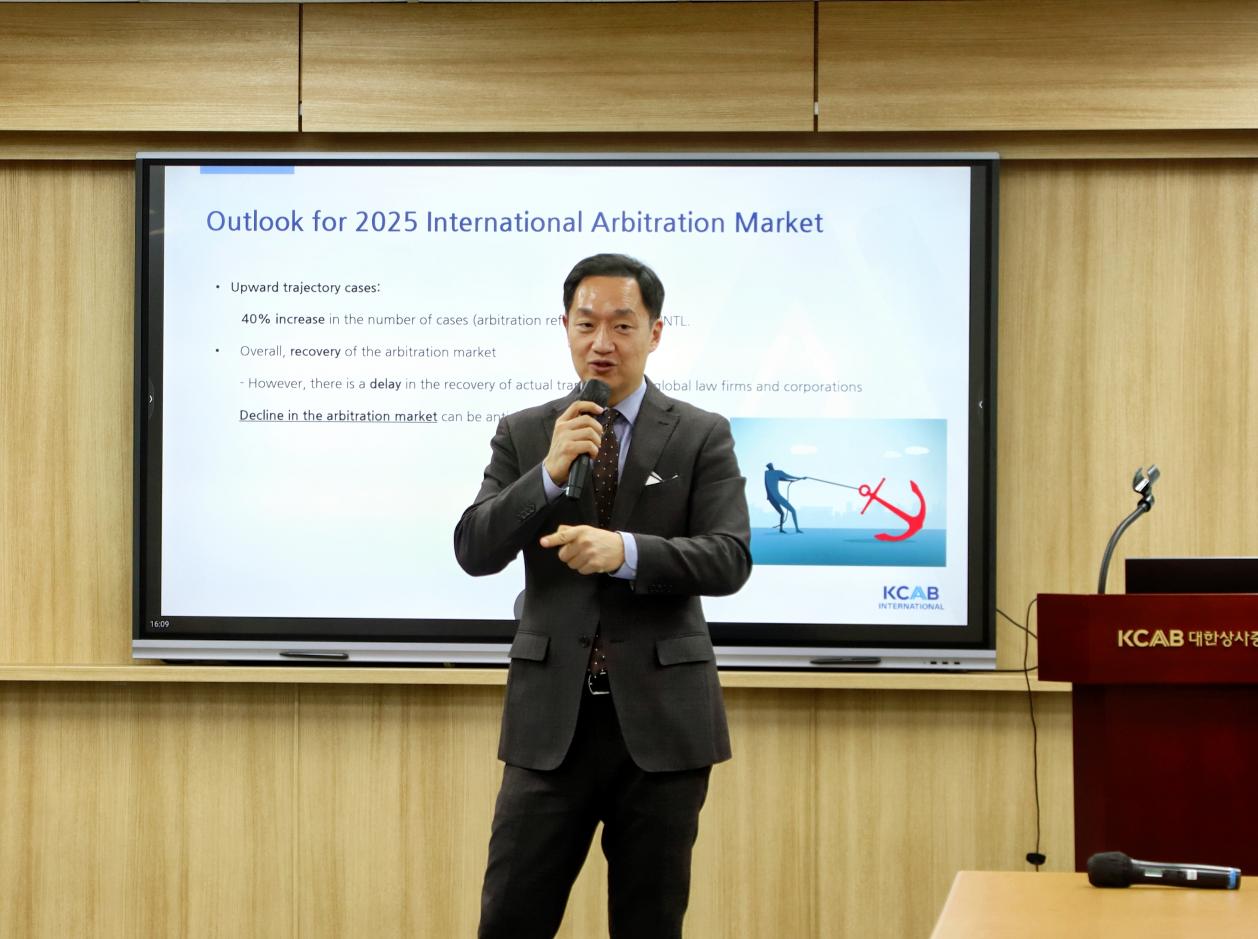
(Presentation by Director Kim Sae-in)
On January 18th, the Zhejiang University Guanghua Law School Korea-Law Winter Camp concluded successfully. Over the course of seven days, faculty and students fully immersed themselves in a multicultural and professional learning environment.Through field visits and in-depth discussions, they broadened their international perspectives and were inspired to reflect on the practice and development of legal systems in different countries. The success of this winter camp highlighted Guanghua Law School’s strong commitment to cultivating legal professionals with a global outlook and exceptional capabilities, while laying a strong foundation for the future growth of both faculty and students in the field of international law.

